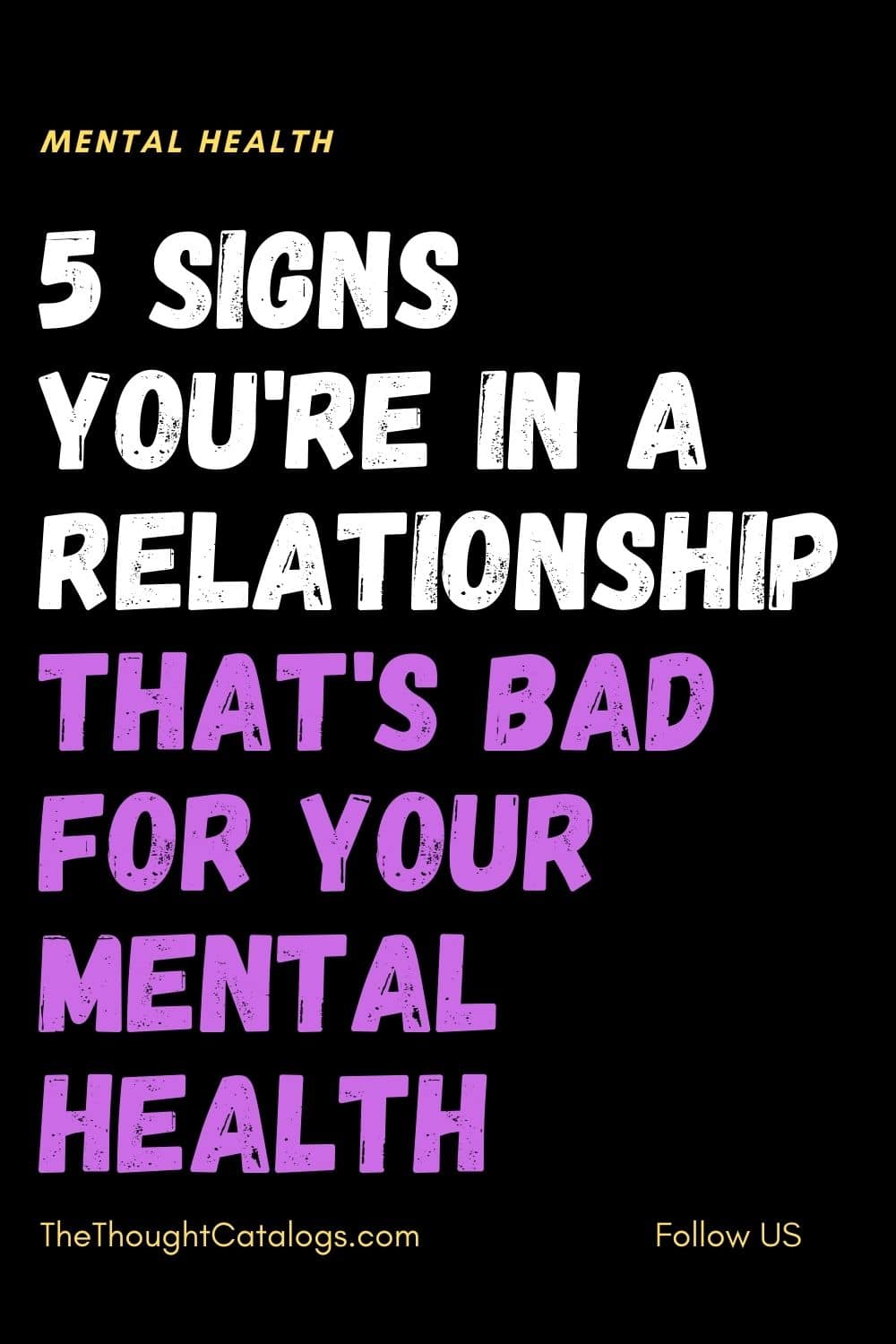5 Signs You’re In A Relationship That’s Bad For Your Mental Health

Introduction
In any relationship, it’s important to prioritize your mental health. While relationships can be a source of joy, support, and growth, they can also have a negative impact on your well-being. It’s crucial to be aware of the signs that indicate you may be in a relationship that is detrimental to your mental health. This article will explore five key signs that suggest you’re in a relationship that’s bad for your mental health and provide insights on how to address them.
Sign 1: Constant Criticism
One significant sign that your relationship is negatively affecting your mental health is constant criticism. If your partner consistently belittles, humiliates, or devalues you, it can erode your self-esteem and lead to feelings of worthlessness. Continuous criticism can make you doubt your abilities and worth, ultimately taking a toll on your mental well-being. It’s essential to recognize this behavior and consider seeking support from a trusted friend, family member, or professional counselor.
Sign 2: Emotional Manipulation
Emotional manipulation is another red flag in a relationship that can harm your mental health. Manipulative partners often use guilt, fear, or intimidation to control and influence your actions or emotions. They may play mind games, gaslight you, or employ other tactics that undermine your confidence and cause emotional distress. Recognizing these manipulative behaviors is crucial to protect your mental well-being. Setting boundaries, expressing your needs assertively, and seeking professional help can empower you to regain control of your mental health.
Sign 3: Isolation
Isolation is a sign that your relationship may be detrimental to your mental health. If your partner consistently isolates you from friends, family, or social activities, it can lead to feelings of loneliness, anxiety, and depression. Healthy relationships encourage personal growth and social connections, while toxic relationships often seek to control and limit your interactions outside the relationship. Recognize the importance of maintaining a support network outside of your romantic relationship and consider seeking advice from a therapist or counselor.
Sign 4: Lack of Support
A lack of support from your partner can be damaging to your mental health. When you’re in a healthy relationship, your partner is there to provide emotional support, empathy, and understanding. However, if your partner consistently dismisses your feelings, invalidates your experiences, or fails to offer support during challenging times, it can leave you feeling isolated and emotionally drained. Communicating your needs openly and honestly with your partner is essential. If the lack of support persists, seeking guidance from a mental health professional can be beneficial.
Sign 5: Impact on Physical Health
A relationship that negatively impacts your mental health can also manifest in physical health issues. Chronic stress, anxiety, and depression resulting from an unhealthy relationship can lead to various physical symptoms such as headaches, fatigue, sleep disturbances, and even a weakened immune system. It’s important to pay attention to these physical manifestations and understand their potential connection to your relationship. Taking care of your mental health through self-care practices, therapy, and open communication can help alleviate these physical symptoms.
Conclusion
Prioritizing your mental health is vital in maintaining a fulfilling and healthy life. Being aware of the signs that indicate you’re in a relationship that’s bad for your mental health is the first step toward making positive changes. If you experience constant criticism, emotional manipulation, isolation, a lack of support, or notice a negative impact on your physical health, it’s crucial to address these issues. Seek support from trusted individuals, communicate openly with your partner, and consider professional help when needed. Remember, your mental well-being matters, and you deserve to be in a relationship that nurtures and supports it.
FAQs
Q1: How can I tell if my partner’s criticism is crossing the line? A1: Constant criticism that belittles, humiliates, or devalues you is a red flag. If it negatively impacts your self-esteem and well-being, it’s important to address the issue and seek support.
Q2: What steps can I take to address emotional manipulation in my relationship? A2: Recognize manipulative behaviors, set boundaries, express your needs assertively, and consider seeking professional help to navigate the complexities of emotional manipulation.
Q3: Is it normal for my partner to isolate me from friends and family? A3: No, it’s not healthy for your partner to isolate you. Healthy relationships encourage personal growth, independence, and maintaining social connections outside of the romantic relationship.
Q4: How can I communicate my need for support to my partner? A4: Open and honest communication is key. Express your feelings and needs to your partner, emphasizing the importance of emotional support, empathy, and understanding in a healthy relationship.
Q5: Can an unhealthy relationship affect my physical health? A5: Yes, chronic stress, anxiety, and depression resulting from an unhealthy relationship can lead to various physical symptoms. It’s important to recognize the potential impact and take steps to address it.




